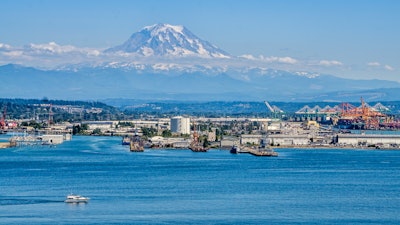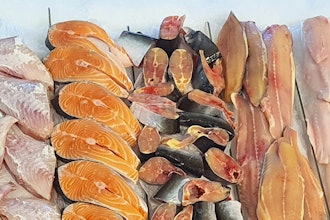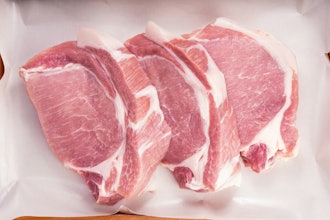
WASHINGTON — Agriculture Secretary Tom Vilsack announced that the U.S. Department of Agriculture will begin accepting applications for the Commodity Container Assistance Program, which currently includes a partnership with the Port of Oakland in California and the Northwest Seaport Alliance, a marine cargo operating partnership between the Port of Seattle and the Port of Tacoma.
Ongoing market disruptions have created logistical challenges associated with the availability and flow of shipping containers to transport agricultural commodities, which has prevented or delayed American-grown agricultural commodities from reaching their markets.
“Both the Port of Oakland and the NWSA in Seattle have been identified as key gateways for American-grown agricultural commodities, and each has experienced significant challenges with the flow of containerized agricultural commodities and products,” Vilsack said. “While USDA’s per-container reimbursements will not cover the full cost of moving and storing shipping containers, the assistance provided will help ensure American-grown agricultural products can once again efficiently move through supply chains to reach global markets.”
Port of Oakland
Fewer shipping containers have been made available for U.S. agricultural commodities as ocean carriers have circumvented traditional marketing channels and rushed containers back to be exported empty and, as a result, many of these carriers have suspended service to the Port of Oakland.
The Howard Terminal “pop up” site in the Port of Oakland will provide space to prepare empty containers. Agricultural companies and cooperatives will have easier access to these containers, which they can fill with commodities, which will help restore shipping services to agricultural commodities while relieving congestion.
For the Port of Oakland, the Agricultural Marketing Service covered 60% of the start-up costs for the “pop up” site and under CCAP the Farm Service Agency (FSA) is providing a $125 per container payment to partially assist agricultural commodity owners for the additional logistical expenses associated with picking up empty shipping containers to be filled with agricultural commodities and products at the Port of Oakland. Under CCAP FSA will also provide payments of $200 per dry container and $400 per refrigerated, or reefer, container to help cover additional logistical costs associated with moving the shipping container twice, first to the preposition site and then to the terminal loading the vessel, along with the cost of temporary storage.
Northwest Seaport Alliance
Congestion-induced impacts to vessel schedules and prioritization of returning containers empty to Asia have significantly raised barriers for exporting agricultural commodities in containers, resulting in lost markets and disappointed customers. The Northwest Seaport Alliance has seen a nearly 30% decline in the export of agricultural commodities in the last six months of 2021 and the ratio of loaded versus empty container exports has shifted to predominately empty containers since May 2021.
In Seattle, a 49-acre existing near-dock facility “pop up” site will be used to accept either dry agricultural or refrigerated, or reefer, containers for temporary storage at NWSA in Seattle to reduce operational hurdles and costs so containers can more quickly be loaded on ships at the export terminals.
For the NWSA, under CCAP FSA will provide payments of $200 per dry container and $400 per reefer container to help cover the additional logistical costs of moving the container twice, first to the preposition site and then to the terminal loading the vessel, along with the cost of temporary storage. The NWSA “pop-up” site itself does not require USDA cost-share assistance as this site already has handling equipment and reefer plugs.
How to apply
The Farm Service Agency (FSA) will make monthly direct payments to agricultural companies and cooperatives on a per-container basis based upon the location of the port, and the type of shipping container, including empty containers, dry filled containers, and reefer filled containers. Both sites will have the ability to pre-cool refrigerated shipping containers to receive perishable commodities.
To apply for CCAP, applicants must complete form FSA-862, Commodity Container Assistance Program (CCAP) Application according to FSA-862 instructions and submit the form to the FSA National Office by email to [email protected]. Payments will be made in arrears and verified with terminal records. A Unique Entity ID (12 alphanumeric characters assigned by SAM.gov) is required. Applicants that wish to receive payment by direct deposit must complete SAM.gov registration online at sam.gov/content/home and provide bank account information. Applicants may submit applications on a monthly basis, but all applications must be submitted by Jan. 31, 2023.
FSA will make payments to eligible owners or designated marketing agents of U.S. agricultural commodities based on the number of eligible shipping containers utilized from March 1, 2022, through Dec. 31, 2022, from the Port of Oakland or the NWSA to ship agricultural commodities to their designated markets on container ships. Eligible commodities include agricultural commodities (other than tobacco) which are grown or produced in the United States for food, feed, or fiber, and products made from those commodities, including certain forestry products.
Visit the Notice of Funds Availability for more information on applicant eligibility and how to apply.
About the partnership
USDA’s partnerships with the Port of Oakland and NWSA is part of the Administration’s Supply Chain Task Force efforts with state and local governments and builds on earlier efforts including a US Department of Transportation partnership with the Port of Savannah in Georgia. The benefits of relieving congestion and addressing capacity issues at ports through partnerships go well beyond the local region, as commodities and agricultural products grown and processed from thousands of miles away flow through these ports.
USDA continues to seek opportunities to partner with additional ports or other intermodal container facilities to help American farmers and agricultural producers move their product to market and manage the short-term challenges while pressing the ocean carriers to restore better levels of service.
USDA touches the lives of all Americans each day in so many positive ways. In the Biden-Harris Administration, USDA is transforming America’s food system with a greater focus on more resilient local and regional food production, fairer markets for all producers, ensuring access to safe, healthy and nutritious food in all communities, building new markets and streams of income for farmers and producers using climate smart food and forestry practices, making historic investments in infrastructure and clean energy capabilities in rural America, and committing to equity across the Department by removing systemic barriers and building a workforce more representative of America. To learn more, visit www.usda.gov.






















